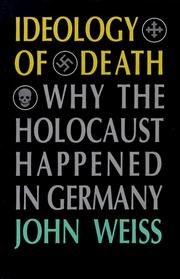Check nearby libraries
Buy this book

In many nations throughout history, the Jews have been reviled and persecuted, regarded as cunning heretics and destructive social parasites. But only in Germany did racist stereotypes evolve into a popular ideology of such lethal force that it ended in the horror of the death camps. Despite a vast literature about anti-Semitism and the Holocaust, we do not yet understand why the destruction of the Jews was conceived and implemented by the Germans.
Ideology of Death supplies this understanding in a stunning and disturbing narrative history. Exploring the unique nature of the German experience as well as the annals of anti-Semitism, Mr. Weiss rejects the notion that the Holocaust was a product of Nazi fanaticism. He shows instead how racist ideas ingrained in German culture led to the unthinkable.
Tracing the culture of racism and anti-Semitism among powerful elites and ordinary Germans, Mr.
Weiss shows how it grew rapidly during the Napoleonic era, became a forceful popular ideology in the 1870s, and in the 1890s gained the dedicated support of the generation that eventually brought Hitler to power. "German Jews became the victims of a uniquely powerful culture of racism," he writes. "Without this historical base, anti-Semitism would not have exploded with such fury after 1918, producing hundreds of thousands of followers whose ideas were no different from those of the Nazis.".
Drawing on the latest research, Mr. Weiss describes how the Nazis, building on traditional German anti-Semitism, adjusted their appeal to a wide variety of social groups that were crucial to their electoral success. The Nazis' extraordinary popularity "could not have occurred if Hitler's hatreds were unique," the author points out. Nor could the actions against the Jews, leading to their destruction. Most Germans saw nothing wrong with such actions. Mr.
Weiss explains the specific complicities of various German groups and institutions in the Holocaust, and why they voluntarily cooperated with the Nazis.
Check nearby libraries
Buy this book

Previews available in: English
| Edition | Availability |
|---|---|
|
1
Ideology of Death: Why the Holocaust Happened in Germany
October 31, 2000, Ivan R Dee
Hardcover
in English
1566630886 9781566630887
|
zzzz
|
|
2
Der lange Weg zum Holocaust.
December 1, 1998, Ullstein Buchverlage GmbH & Co. KG / Ullstein Tas
Paperback
3548265448 9783548265445
|
zzzz
|
|
3
Ideology of Death: Why the Holocaust Happened in Germany
September 25, 1997, Ivan R. Dee, Publisher
Paperback
in English
- 1 edition
1566631742 9781566631747
|
cccc
|
|
4
Der lange Weg zum Holocaust: Die Geschichte der Judenfeindschaft in Deutschland und Österreich
1997, Hoffmann und Campe
Hardcover
in German
3455112102 9783455112108
|
zzzz
|
|
5
Der lange Weg zum Holocaust: die Geschichte der Judenfeindschaft in Deutschland und Österreich
1997, Hoffmann und Campe
in German
3455112102 9783455112108
|
zzzz
|
|
6
Ideology of death: why the Holocaust happened in Germany
1996, I.R. Dee
in English
1566630886 9781566630887
|
aaaa
|
Book Details
Edition Notes
Includes bibliographical references (p. 399-412) and index.
Classifications
The Physical Object
ID Numbers
Source records
Scriblio MARC recordIthaca College Library MARC record
marc_openlibraries_sanfranciscopubliclibrary MARC record
marc_claremont_school_theology MARC record
Library of Congress MARC record
marc_claremont_school_theology MARC record
Internet Archive item record
Better World Books record
marc_columbia MARC record
Work Description
In his 1995 work, Ideology of Death, Weiss again breaks with tradition by suggesting that the Holocaust did not depend upon the unique character of Adolph Hitler for its inspiration. The culture of post-World War I Germany—which had its political roots in the anti-Semitic sentiment encouraged by several Lutheran and Catholic clergymen during the nineteenth century—contained numerous social groups "with hundreds of thousands of followers whose ideas were no different from those of the Nazis," according to the author. Anti-Semitism was only a part of the "kaleidoscope of hatreds" that characterized German society at the time, explained New York Times Book Review critic Michael S. Sherry, and it "overlapped, in bewildering and contradictory ways, other hatreds," including those against Czechs, Slavs, Catholics, and others. Such prejudices crystallized under Hitler, but were not inspired by him. While noting that by "ascrib[ing] consistency, power, even perverse sincerity, to ideas" such as anti-Semitism, Weiss is writing "old-fashioned history," Sherry praised Ideology of Death for its ability to "invite … other historians to grasp the full scale of modern Europe's hatreds."
(Source: encyclopedia.com)
Links outside Open Library
Community Reviews (0)
Feedback?| July 18, 2024 | Edited by MARC Bot | import existing book |
| November 17, 2022 | Edited by ImportBot | import existing book |
| October 18, 2022 | Edited by Gustav-Landauer-Bibliothek Witten | author, BookBrainz |
| October 18, 2022 | Edited by Gustav-Landauer-Bibliothek Witten | Merge works |
| December 10, 2009 | Created by WorkBot | add works page |















